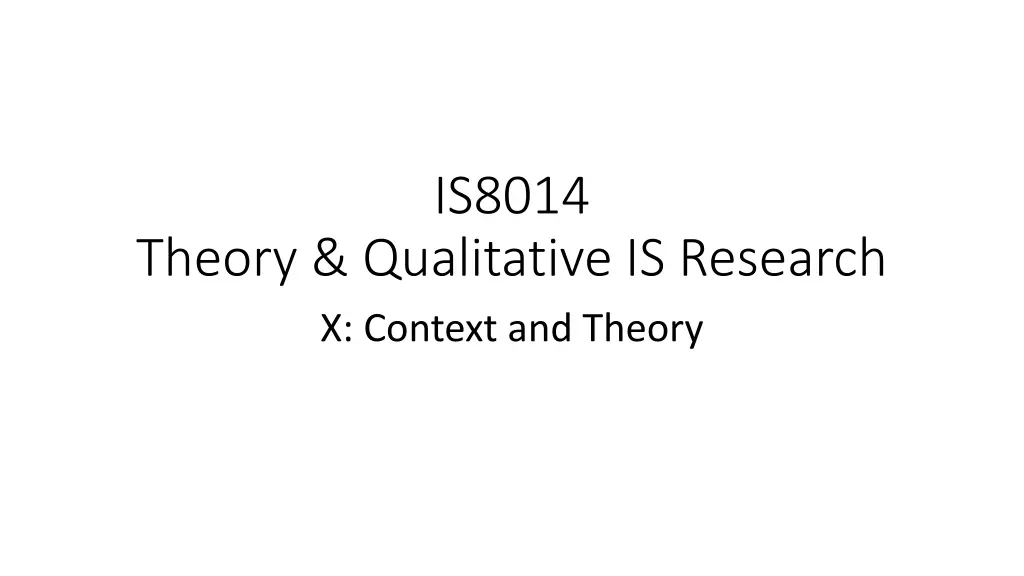
Exploring Context and Theory in IS Research: A Deep Dive into Theoretical Perspectives
Delve into the intricate relationship between context and theory in IS research, exploring the diverse levels of theories and the importance of cultural nuances in theoretical frameworks. Discover the implications of time on organizational dynamics and theorizing for future relevance. Reflect on the need for more contextually-specific theories and the challenges in theorizing time directly.
Download Presentation

Please find below an Image/Link to download the presentation.
The content on the website is provided AS IS for your information and personal use only. It may not be sold, licensed, or shared on other websites without obtaining consent from the author. If you encounter any issues during the download, it is possible that the publisher has removed the file from their server.
You are allowed to download the files provided on this website for personal or commercial use, subject to the condition that they are used lawfully. All files are the property of their respective owners.
The content on the website is provided AS IS for your information and personal use only. It may not be sold, licensed, or shared on other websites without obtaining consent from the author.
E N D
Presentation Transcript
IS8014 Theory & Qualitative IS Research X: Context and Theory
Student Presentation 4 Today s class relates to context and theory I expect to see a robust discussion about different types of context and how they relate to theory Guiding questions are on the next slide
Guiding Questions 1. Theories can be positioned at different levels micro, mid range, grand, meta. Each makes a different kind of contribution. See Leidner and Tona (2021). Some concerns have been raised about how much context should be evidenced in a theory more context tends to lead to more of a micro theory. Is that a problem? See also Davison and Martinsons (2016). Are there value differences between the different levels of theory (some are more valuable than others) or are they just different (but potentially of equal or similar value)? Which stakeholders are likely to appreciate more contextually-specific theory? Why? Historically, most theories have been written by authors in the USA. Is that a problem? What are the limitations of such culturally-narrow theorising? Several scholars (e.g. Tsui, 2006; Davison and Martinsons, 2016) suggest that there is a need for more indigenous theorizing, i.e. theorizing that draws on locally specific cultural or contextual phenomena. In the Chinese context, this can include such concepts as guanxi, renqing, etc. What advantages may accrue if we draw on a wider range of particular cultural phenomena in our theorising? 2. 3. 4. 5.
Readings for Next Week Bluedorn, A. C., & Denhardt, R. B. 1988. Time and organizations. Journal of Management, 14: 299- 320. Bluedorn, A. C., Kaufman, C. F., & Lane, P. M. 1992. How many things do you like to do at once? An introduction to monochronic and polychronic time. Academy of Management Executive, 6(4): 17- 26. Davison, R.M. and Tarafdar, M. (2018) Shifting baselines may threaten our future relevance, Information Systems Journal 28, 4, 587-591. George, J. M., & Jones, G. R. 2000. The role of time in theory and theory building. Journal of Management, 26: 657- 684. Gersick, C.J.G. (1991) Revolutionary Change Theories: A Multilevel Exploration of the Punctuated Equilibrium Paradigm, Academy of Management Review 16, 1, 10-36. Maznevski, M.L. and Chudoba. K.M. (2000) Bridging space over time: Global virtual team dynamics and effectiveness, Organization Science 11, 5, 473-492. Mitchell, T.R., & James, L.R. (2001) Building Better Theory: Time and the Specification of When Things Happen, Academy of Management Review 26, 4, 530-547. Romanelli, E. and M.L. Tushman. (1994) Organizational Transformation as Punctuated Equilibrium: An Empirical Test, Academy of Management Journal 37, 5, 1141-1666.
Questions for Next Week What is time? How do you think about time? What is the role of time in cause-effect relationships and how should theory take time into consideration? What is the impact of time on the way groups of people work (with technology) and what are the implications of time for theorising? What happens when time is interrupted or punctuated, from a theoretical perspective? How can we theorise time more directly? What are the challenges of doing so?
